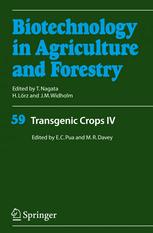

Most ebook files are in PDF format, so you can easily read them using various software such as Foxit Reader or directly on the Google Chrome browser.
Some ebook files are released by publishers in other formats such as .awz, .mobi, .epub, .fb2, etc. You may need to install specific software to read these formats on mobile/PC, such as Calibre.
Please read the tutorial at this link: https://ebookbell.com/faq
We offer FREE conversion to the popular formats you request; however, this may take some time. Therefore, right after payment, please email us, and we will try to provide the service as quickly as possible.
For some exceptional file formats or broken links (if any), please refrain from opening any disputes. Instead, email us first, and we will try to assist within a maximum of 6 hours.
EbookBell Team

4.3
48 reviewsGenetic engineering is a powerful tool for crop improvement. Crop biotechnology before 2001 was reviewed in Transgenic Crops I-III, but recent advances in plant cell and molecular biology have prompted the need for new volumes.
Transgenic Crops IV deals with cereals, vegetables, root crops, herbs and spices. Section I is an introductory chapter on the impact of plant biotechnology in agriculture. Section II focuses on cereals (rice, wheat, maize, rye, pearl millet, barley, oats), while Section III is directed to vegetable crops (tomato, cucumber, eggplant, lettuce, chickpea, common beans and cowpeas, carrot, radish). Root crops (potato, cassava, sweet potato, sugar beet) are included in Section IV, with herbs and spices (sweet and hot peppers, onion, garlic and related species, mint) in Section V.
This volume is an invaluable reference for plant breeders, researchers and graduate students in the fields of plant biotechnology, agronomy, horticulture, genetics and both plant cell and molecular biology.